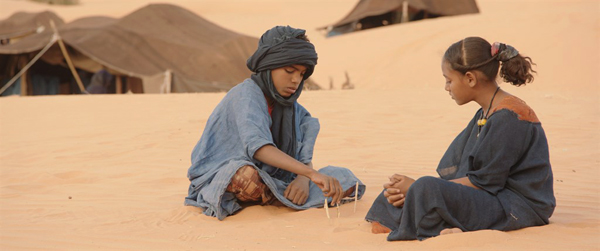![]() Passionately humanistic as it is poetic, Timbuktu is an urgent and timely portrait of the rich culture of Mali. Set in a long tolerant community, which has been at a crossroads of camel caravans for millennia, the clash between tradition and the ravages caused by Islamic fundamentalist militias is established in the opening shots: from the hunt of a gazelle to the shooting of non-Islamic ritual masks–which viscerally recalls the 2013 burning of the ancient manuscript library in the ancient city.
Passionately humanistic as it is poetic, Timbuktu is an urgent and timely portrait of the rich culture of Mali. Set in a long tolerant community, which has been at a crossroads of camel caravans for millennia, the clash between tradition and the ravages caused by Islamic fundamentalist militias is established in the opening shots: from the hunt of a gazelle to the shooting of non-Islamic ritual masks–which viscerally recalls the 2013 burning of the ancient manuscript library in the ancient city.
Raised in Mali, director Abderrahmane Sissako emphasizes the brutal impact on the lives of families, particularly women. A central focus here is a loving family of GPS and cell phone using shepherds, who have resisted fleeing like their neighbors. While patriarch Kidane (Mali-born Ibrahim Ahmed a.k.a. Pino) declares he’s more anchored to his family than he is to Mecca, his wife, Satima (Toulou Kiki, from Niger), would prefer the safety of living closer to others. Meanwhile, their 12-year-old daughter Toya misses her girlfriends. (Layla Walet Mohamed is so appealing on camera that the filmmaker rewrote the story to raise the daughter’s age).
While the mother comforts the lonely girl with folk songs, the father assures her that the militants’ occupation is temporary and that the other tents will return and their normal, peaceful life will resume. However, a confrontation with a fisherman, angry that the family’s eight cattle have trampled his fishing nets, entangles the father in the new, cruel, primitive, and violent justice system. Mother and daughter are left to struggle alone, bolstered only by their songs, now forbidden by the ruling religious authorities.
A ban on singing is just one of the ratcheted up restrictions now placed on women. One smoky-voiced chanteuse (Fatoumata Diawara) persists in crooning with flute and stringed instrument accompanists, to dire consequences. A vendor in the market, based on a real-life rebellious woman, mocks as impractical the order to cover her hands with long gloves; it makes her handling produce impossible. In another subplot, a widow rebuffs a jihadist’s marriage proposal to her teen daughter, saying it runs counter to their traditional procedures of vetting suitors. The militant angrily denounces her as disrespectful and threatens a forced marriage anyway, chillingly reminiscent of the news of what’s happening to girls in the path of Boko Haram. Also inspired by another notorious case is the horrible punishment of an unmarried couple, which feels more casually authentic, and less melodramatic, than Cyrus Nowrasteh’s Iran-set The Stoning of Soraya M. (2008).
The impact on local religious men is shown as well, when the imam (Adel Mahmoud Cherif), also based on an actual leader, remonstrates against foreign jihadists for bringing their shoes and weapons into the mosque, let alone when he criticizes their bad Arabic and inability to communicate in the local dialect. (The cast includes Tuaregs, who have dispersed as far as Madrid and Paris, since ethnic clashes had led to a diaspora that preceded the fundamentalists’ takeover.)
At the New York Film Festival press conference, the director said he wanted to show that “A jihadist is just like us, and that’s the real danger,” and the occupiers are pretty much seen as hypocritical thugs, swaggering teenagers, sneaking cigarettes and glimpsing soccer on TV, which they have banned from the populace. Sissako includes a more-hardened jihadist-in-charge who has been on the attack since the chaos of the Libyan revolution.
Music suffuses Timbuktu, portraying it as intrinsic to Sufi Muslim culture and everyday life, antithetical to the extreme fundamentalists’ definition of Islam. While the French liberated the region after a year under Sharia law, filming had to be moved for safety to the architecturally similar city of Oualata in Mauritania, protected by the national army, to produce the country’s first ever foreign-language Oscar candidate, and now a well-deserved nominee.

















Leave A Comment